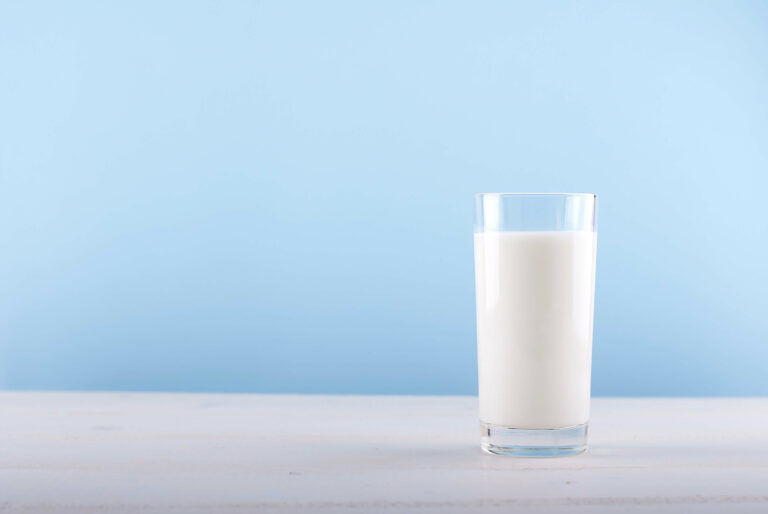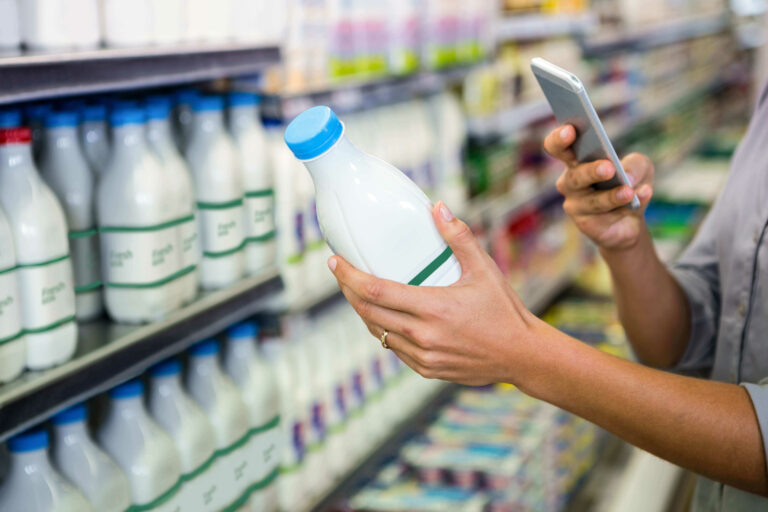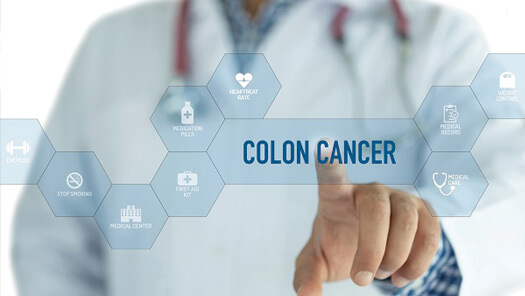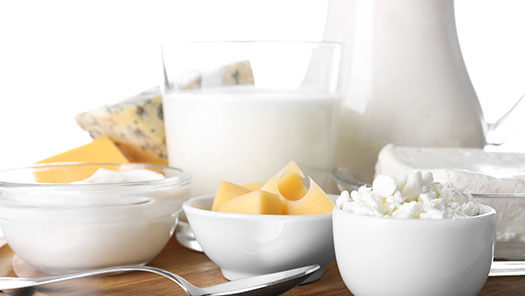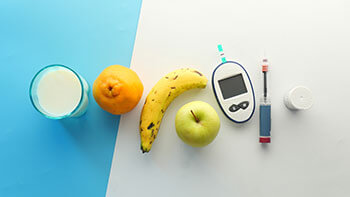Milk Nutritions Facts Milk is a source of essential nutrients. There is extensive evidence to show that including milk and..
GET THE FACTSDAIRY AND COLORECTAL CANCER
Colorectal cancer is the second leading cause of cancer-related deaths in men and the third in women. About 24,000 Canadians are diagnosed with colorectal cancer annually, representing 10% of all new cancer cases.1 Given these statistics, cancer prevention should be top of mind in your patient care, and lifestyle changes can play a role. The American Institute for Cancer Research (AICR) says colorectal is one of the most preventable types of cancer, and that a balanced diet paired with physical activity can prevent almost half of all colorectal cancer cases.2 When it comes to nutrition, research shows dietary patterns that are high in fibre, calcium, and dairy products can help reduce the risk of developing colorectal cancer.3 Download the colorectal cancer fact sheet
Nutrition recommendations
Dairy foods are protective against colorectal cancer. Researchers believe it’s due to the calcium, vitamin D, and probiotics that are found in dairy.4 Recommend that your patients aim for 2-3 servings of dairy products per day. One serving is equal to a cup of milk or yogurt, or 1.5 ounces of cheese. Research also shows that diets rich in fibre can help prevent colorectal cancer.5 Patients should aim for 25-35 grams of fibre per day from vegetables, fruits, whole grains, nuts, seeds and legumes.6 Your patients can create healthy, fibre-rich meals by following these guidelines:
- Filling a quarter of the meal with protein rich foods such as milk, yogurt, cheese, eggs, legumes, fish or poultry
- Filling half the meal with vegetables and fruit. These can be fresh, frozen, canned, raw or cooked
- Fill a quarter of the meal with whole grains such as oats, barley, brown rice or whole wheat
- Limit red meat, such as beef and lamb to 350-500 grams (12-18 ounces) cooked weight per week
- Avoid processed meat (bacon, hotdogs, deli meat, ham, etc.) except for special occasions
- Limit alcohol to no more than two drinks daily for men; or one drink for women.
- One drink is: 150ml wine, 350ml beer, or 45ml liquor
- conjugated linoleic acid
- butyric acid (a short-chain fatty acid)
- lactic acid bacteria
- sphingolipids13,14
Practical tips for patients
Here is some advice to share with your patients to help reduce the risk of developing colorectal cancer:15
Use the plate model to build nutritious meals.
Enjoy 2-3 servings of dairy products each day. One serving is equal to a cup of milk
or yogurt, or 1.5 ounces of cheese.
Enjoy fibre-rich foods such as vegetables, fruit, beans, grains and nuts. Aim for
25-35 grams of fibre per day.
Be physically active. Aim for at least 150 minutes of aerobic activity per week,
in bouts of 10 minutes or more.
Limit red and processed meat to no more than 3 portions per week.
That’s 350-500 grams (12-18 ounces) cooked weight.
If you don’t drink alcohol, don’t start. If you do drink, limit alcohol to one drink for women and two drinks for men per day.
Read more from Hospital News: Milk and colorectal cancer – what does the research say?
Studies show inverse associations of colorectal cancer risk for people who consume 400 grams per day of total dairy and 200 grams per day of milk.16,17 One cup of milk is 240 grams
CITATIONS
1 https://cancer.ca/en/cancer-information/cancer-types/colorectal/statistics
2 https://www.aicr.org/news/6-steps-to-protect-yourself-from-colorectal-cancer/
3 https://www.aicr.org/research/the-continuous-update-project/colorectal-cancer/
4 https://www.gastrojournal.org/article/S0016-5085(15)00011-6/fulltext
5 Gianfredi V at al. (2018) Int J Food Sci Nutr. 2018;69(8):904-915. doi:10.1080/09637486.2018.1446917
6 Barber T et al. (2020). Nutrients. Oct 21;12(10):3209. doi: 10.3390/nu12103209
7 https://www.aicr.org/research/the-continuous-update-project/meat-fish-dairy/
8 https://www.ncbi.nlm.nih.gov/pmc/articles/PMC6518136/
9 https://www.hindawi.com/journals/jo/2021/9948814/
10 https://www.frontiersin.org/articles/10.3389/fonc.2022.812679/full
11 https://www.gastrojournal.org/article/S0016-5085(15)00011-6/fulltext
12 https://onlinelibrary.wiley.com/doi/10.1002/ijc.30293
13 https://pubmed.ncbi.nlm.nih.gov/33231228/
14 https://www.tandfonline.com/doi/full/10.1080/15384047.2017.1345396
15 https://www.cancercareontario.ca/en/cancer-facts/updated-cancer-prevention-guidelines-incorporate-holistic-view-nutrition
16 https://aacrjournals.org/cebp/article/29/11/2309/72050/Dairy-Consumption-and-Risks-of-Colorectal-Cancer
17 https://onlinelibrary.wiley.com/doi/10.1002/ijc.31198
Resources
Disease Prevention
Disease Prevention Milk plays a role in disease prevention for many chronic conditions, including heart disease, hypertension, type 2 diabetes..
GET THE FACTSMilk and Plant Based Drinks
MILK AND PLANT BASED DRINKS There are many different plant-based beverages (PBB) available in the grocery store and it is..
GET THE FACTSHeart Health Benefits Of Milk
Heart Health Benefits Of Milk Diet and lifestyle play a role in heart disease prevention. It is estimated that 80%..
GET THE FACTSDairy and Colorectal Cancer
DAIRY AND COLORECTAL CANCER Colorectal cancer is the second leading cause of cancer-related deaths in men and the third in..
GET THE FACTSMilk and Hypertension
MILK AND BLOOD PRESSURE Milk plays a role in disease prevention for many chronic conditions, including heart disease and hypertension...
GET THE FACTSMilk and Lactose Intolerance
Milk and Lactose Intolerance Having lactose intolerance does not mean your patients need to give up dairy Highlights: Evidence shows..
GET THE FACTSMilk and Physical Activity
Milk and Physical Activity Whether your patients are occasional gym-goers or are training intensely for a triathlon or sport tournament,..
GET THE FACTSMilk and Pediatric Nutrition
MILK AND PEDIATRIC NUTRITION Growing Strong: The Importance of Milk to Nourish Children Leading pediatric and health organizations recognize the..
GET THE FACTSMilk and Mucus
Milk and Mucus The current body of research indicates that milk and other dairy foods do not increase mucus production...
GET THE FACTSDiabetes Prevention and Milk
Diabetes Prevention And Milk How milk plays a role in preventing type 2 diabetes More than 5.7 million Canadians have..
GET THE FACTSHolistic Health Benefits of the Milk Matrix
Holistic Health Benefits of the Milk Matrix: Beyond Individual Nutrients For many years, nutrition research focused on how individual nutrients,..
GET THE FACTS
